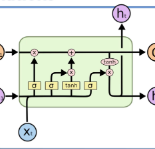The amount of textual data generation has increased enormously due to the effortless access of the Internet and the evolution of various web 2.0 applications. These textual data productions resulted because of the people express their opinion, emotion or sentiment about any product or service in the form of tweets, Facebook post or status, blog write up, and reviews. Sentiment analysis deals with the process of computationally identifying and categorizing opinions expressed in a piece of text, especially in order to determine whether the writer's attitude toward a particular topic is positive, negative, or neutral. The impact of customer review is significant to perceive the customer attitude towards a restaurant. Thus, the automatic detection of sentiment from reviews is advantageous for the restaurant owners, or service providers and customers to make their decisions or services more satisfactory. This paper proposes, a deep learning-based technique (i.e., BiLSTM) to classify the reviews provided by the clients of the restaurant into positive and negative polarities. A corpus consists of 8435 reviews is constructed to evaluate the proposed technique. In addition, a comparative analysis of the proposed technique with other machine learning algorithms presented. The results of the evaluation on test dataset show that BiLSTM technique produced in the highest accuracy of 91.35%.
翻译:文本数据生成量由于因特网的不努力接入和各种网络2.0应用程序的演变而大幅增加。这些文本数据制作之所以产生,是因为人们以推特、脸书文章或状态、博客写作和评论等形式表达他们对任何产品或服务的意见、情感或情绪。感化分析涉及对在文本中表达的意见进行计算性识别和分类的过程,特别是为了确定作者对某个特定主题的态度是正面的、负面的还是中性的。客户审查的影响对于了解顾客对餐馆的态度意义重大。因此,自动检测审查的情绪有利于餐厅所有者或服务供应商和客户使其决定或服务更令人满意。这份文件提议,一种深层次的学习技术(即BILSTM),将餐馆客户提供的审查分为积极的和负面的两极分化。建立了由8435项审查组成的综合体,以评价拟议的技术。此外,对拟议的技术与其他机器学习算法进行比较分析。对BILSTM的测试结果显示,BILSTM技术的精确度最高。




